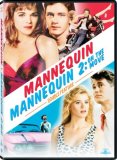| Reviews & Columns |
|
Reviews DVD TV on DVD Blu-ray 4K UHD International DVDs In Theaters Reviews by Studio Video Games Features Collector Series DVDs Easter Egg Database Interviews DVD Talk Radio Feature Articles Columns Anime Talk DVD Savant Horror DVDs The M.O.D. Squad Art House HD Talk Silent DVD
|
DVD Talk Forum |
|
|
| Resources |
|
DVD Price Search Customer Service #'s RCE Info Links |
|
Columns
|
|
|
Mannequin & Mannequin 2: On the Move
MGM // PG // April 15, 2008
List Price: $14.98 [Buy now and save at Amazon]
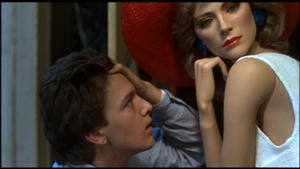 So here's where we were as a nation in February of 1987: Hollywood asked us if we'd like to see Andrew McCarthy and Kim Cattrall in a comedy about a hapless artist who falls in love with a department store dummy who comes to life, with a supporting cast that includes Estelle Getty, James Spader, G.W. Bailey, and that guy from "Designing Women." Our collective response was yes, but only if you can get Starship to sing some sort of horrible power ballad at the end. And thus "Mannequin" was born.
So here's where we were as a nation in February of 1987: Hollywood asked us if we'd like to see Andrew McCarthy and Kim Cattrall in a comedy about a hapless artist who falls in love with a department store dummy who comes to life, with a supporting cast that includes Estelle Getty, James Spader, G.W. Bailey, and that guy from "Designing Women." Our collective response was yes, but only if you can get Starship to sing some sort of horrible power ballad at the end. And thus "Mannequin" was born.It's tough to imagine that a movie as utterly, hopelessly terrible as "Mannequin" could have ever been a hit, yet there it was, raking in the box office cake week after week. This was 1987, after all, the year of "Dirty Dancing," "Police Academy 4," "Harry and the Hendersons," and "Can't Buy Me Love." It was the year "Three Men and a Baby" was more popular than any other film, even though Steve Guttenberg was in it. The year "ALF" came to television. The year artists like Tiffany, Whitesnake, and Lisa Lisa and Cult Jam were allowed to have number one singles. It was a stupid year, and we were stupid people.
Indeed, "Mannequin" is one of the stupidest movies ever conceived, and one of the worst. Which makes it, in its own lousy way, mesmerizing. To watch it is to get sucked in by its hypnotic ways; its very off-the-wall shoddiness is astounding. Spader alone is worth the price of admission - surely aware of the movie's badness, the actor hams it up with a deliriously over-the-top performance, hidden under nerdy poses and a greasy haircut. It's as if his character was bussed in from a completely different movie, perhaps a parody of 80s romcoms as directed by David Lynch.
Compare him to McCarthy and Cattrall, who play things straight, struggling to make the most out of a sex farce that wants to be dirty while simultaneously landing a PG rating. Their performances consist mainly of cheap slapstick and mushy romance, not to mention the abysmal trying-on-clothes montage set to crappy, anonymous 80s synth-pop. Both stars do their best to remain charming despite the material, although it never quite works; McCarthy was always too whitebread to be an effective leading man, while any jokes about Cattrall playing a piece of wood remain applicable.
The story opens in ancient Egypt, or as the subtitle puts it, "a really long time ago, right before lunch," because the script wants to start with the bad jokes early. Emmy (Cattrall) is an Egyptian princess with, for some reason, a Jewish mother (Phyllis Newman) - which is either a very dry, witty joke on the part of the filmmakers, or a very dumb one. Considering the next few jokes involve camel dung, dry wit is perhaps the wrong guess.
Emmy is supposed to get married, but she's not willing, and when she prays to the gods for help, they answer by zapping her into an animated credits sequence (theme song by Belinda Carlisle!) that shows her meeting up with all the great men throughout time: Columbus, Da Vinci, and so on. But she passes on them all, because she awaits the man of her dreams. What possible hero could ever top the greatness of such noble thinkers? Unemployed artist and insufferable heel Andrew McCarthy, that's who.
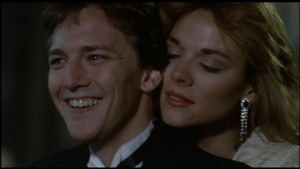 McCarthy plays Jonathan Switcher, a poor dolt who mistakes mannequin assembly for fine art. An entire scene is wasted following Jonathan around the factory, mixing and matching mannequin parts, blissfully unaware that they all pretty much fit the same template anyway. (There's a "big laugh" when Jonathan attaches the female head-and-torso to a male bottom and laughs. The movie has forgotten that mannequins have no genitals, but more importantly, it has forgotten that such a joke isn't really that funny in the first place.) Jonathan is so enamored with his Perfect Creation (seriously, movie? seriously??) that even after he's fired from this and a series of other jobs (his general incompetence at life itself proving him to be unworthy of status as the movie's hero), he's able to recognize the dummy in a department store window days later - even though they all pretty much look the same anyway.
McCarthy plays Jonathan Switcher, a poor dolt who mistakes mannequin assembly for fine art. An entire scene is wasted following Jonathan around the factory, mixing and matching mannequin parts, blissfully unaware that they all pretty much fit the same template anyway. (There's a "big laugh" when Jonathan attaches the female head-and-torso to a male bottom and laughs. The movie has forgotten that mannequins have no genitals, but more importantly, it has forgotten that such a joke isn't really that funny in the first place.) Jonathan is so enamored with his Perfect Creation (seriously, movie? seriously??) that even after he's fired from this and a series of other jobs (his general incompetence at life itself proving him to be unworthy of status as the movie's hero), he's able to recognize the dummy in a department store window days later - even though they all pretty much look the same anyway.After another gigantic chunk of tiresome exposition that includes Jonathan saving the life of Mrs. Timkin (Getty), the kindly owner of a department store, which leads to him landing a job, which leads to him tracking down his perfect mannequin, we finally get to the point: for reasons completely unclear, the mannequin is actually Emmy, or, at least, it turns to Emmy whenever only Jonathan is looking. They fall in love, for reasons also completely unclear, and then Jonathan becomes the store's hot new window dresser, creating dazzling displays that make the store a success. (The cost effectiveness of creating a new elaborate window display each night is yet another plot point that remains completely unclear.)
The rest of the movie involves a rival store trying to woo Jonathan away, and when he turns them down, they try to steal the mannequin, because by this point everyone thinks the guy has some weird dummy fetish, since he's always waking up naked next to a mannequin and all. The plan essentially consists of an inept security guard (Bailey, regurgitating the same worn-out shtick that carried him through the "Police Academy" series) falling over a lot, although sometimes he finds Jonathan in a comprising position with the mannequin and grumbles about sexual deviancy. (The film's advertising attempted to turn "Switcher, you are one sick puppy" into some sort of national catchphrase. And that was where we, as Americans, drew the line.)
Somewhere in the middle of all of this, Meshach Taylor pops up as Hollywood Montrose, arguably the most offensive stereotype to grace the big screen since Mickey Rooney donned buck teeth for "Breakfast at Tiffany's." Hollywood's existence here is a real head-scratcher. The screenplay goes out of its way not only to make him some sort of positive character (he's shown as Jonathan's only true friend and manages to help save the day in the finale) but also to defend him (when the guard throws out some bigoted remarks, Jonathan insults him right back) - and yet there's also enough limp-wristed swishiness on display to set back GLAAD a few decades. Hollywood is a gloriously out camp queen, but as played, we're meant to laugh at him, not with him.
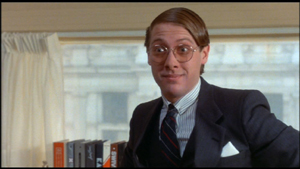 There is also Carole Davis (think of Fran Drescher without the nasal whine) as Jonathan's snooty ex-girlfriend Roxie, and Christopher Maher as Armond, a creature of indeterminate European origin who exists only to stand behind Roxie at all times and ogle her. The former makes sense - the plot needs a rival for Jonathan's affections, even if the character doesn't quite earn them - but the latter comes off like the result of a bar bet gone terribly wrong: "I'll wager you can't cram in an inessential Eurosleaze type who's always saying inappropriate things!" "I'll take that bet!"
There is also Carole Davis (think of Fran Drescher without the nasal whine) as Jonathan's snooty ex-girlfriend Roxie, and Christopher Maher as Armond, a creature of indeterminate European origin who exists only to stand behind Roxie at all times and ogle her. The former makes sense - the plot needs a rival for Jonathan's affections, even if the character doesn't quite earn them - but the latter comes off like the result of a bar bet gone terribly wrong: "I'll wager you can't cram in an inessential Eurosleaze type who's always saying inappropriate things!" "I'll take that bet!"And it all ends with Starship, those faded rockers who ended their long evolution from counterculture icons to shallow MTV-ready jackasses here, a year after they told us how they built that city on rock and roll, despite the fact that the song describing such a feat featured neither rock nor roll. Their syrupy anthem they churned out to fill the role of the movie's love theme, "Nothing's Gonna Stop Us Now," sounds like a threat, and in a way it is: the song is the ultimate earworm, catchier and hookier and far more vapid than anything Rick Astley could have provided. Naturally, it went to number one on the charts and wound up landing an Oscar nomination for Best Song, because we, as Americans, were stupid.
This was the first feature from director Michael Gottlieb (his brother, Carl, wrote "Jaws"), who went on to helm such titles as "A Shrimp on the Barbie" and "Mr. Nanny" before quitting movies altogether and becoming a video game producer, where his works would show a step up in character development and story complexity. Gottlieb co-wrote the screenplay with another then-newcomer, Edward Rugoff, who then co-wrote "Mr. Nanny" with Gottlieb, but not before agreeing to return to the franchise with 1991's "Mannequin: On the Move."
Oh, yes, there was a sequel. Gottlieb was smart enough to step aside, as was everyone else - except for Rugoff and Taylor, who returned to play Hollywood once more, because apparently some people never learn.
Rugoff's script was handed over to sitcom vets David Isaacs and Ken Levine for a polish, who in turn saw their draft reworked by Betty Israel (who marks this as her only movie credit). This means four different people were credited with writing "Mannequin: On the Move," and I bet to this day they're still arguing over who deserves recognition for the part where Hollywood performs hip-hop.
Directing duties, meanwhile, were handed off to Stewart Raffill, a man who previously made such gems as the "sci-fi" "comedy" "The Ice Pirates" and the McDonald's commercial/"E.T." rip-off "Mac and Me." (He's since gone on to helm family-friendly direct-to-video fare, low budget flicks with names like "Tammy and the T-Rex.")
"On the Move" (the movie was also promoted with the not-nearly-as-clever-as-it-thinks-it-is, ultimately unused title "Mannequin Two") is as woefully incompetent as its predecessor, except it's dealing with a smaller budget, you know, for added dreadfulness. Its producers scoured the country for a rising star even more flavorless than Andrew McCarthy and eventually turned to William Ragsdale, a bland young lad fresh off the "Fright Night" movies. Ragsdale plays Jason Williamson, a department store intern (who interns in retail?) who falls for a prized statue from the "hilarious" European kingdom of Hauptman-Koenig. Legend has it that the prized statue contains the spirit of a peasant girl named Jessie who was tricked by a sorcerer, and only True Love will break the spell.
Only we know it's not just a legend, since we saw the whole thing in an unbearably long prologue, again featuring Jewish mothers. Rasgale appears as the handsome prince, Jessie the peasant girl is played by Kristy Swanson, and the sorcerer is Terry Kiser, fondly remembered as the title character from "Weekend at Bernie's," itself an inexplicable hit featuring Andrew McCarthy. (Oh, yes, in 1989 we were still very stupid.) There is a running gag involving the sorcerer's facial mole, which has a very long hair dangling from it. There are many ways such a joke could have been funny, and the script manages to utilize none of them.
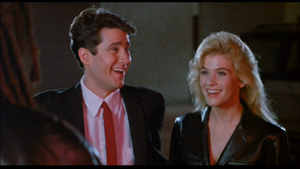 In keeping with the spirit of the franchise, the reasons why the prized statue is set to go on display at a department store in Philadelphia remains completely unclear (although one suspects it's the only way we could consider her a mannequin). We discover that the simple removal of a cursed necklace, and not True Love, will break the spell and bring Jessie to life - even though the script keeps mentioning True Love later on, because the script does not understand how to follow its own rules.
In keeping with the spirit of the franchise, the reasons why the prized statue is set to go on display at a department store in Philadelphia remains completely unclear (although one suspects it's the only way we could consider her a mannequin). We discover that the simple removal of a cursed necklace, and not True Love, will break the spell and bring Jessie to life - even though the script keeps mentioning True Love later on, because the script does not understand how to follow its own rules.Jason and Jessie fall quickly in love, go dancing at a swank nightclub, and wind up getting chased once or twice by the descendant of the sorcerer, Count Spretzle (Kiser again). There's something about how Spretzle needs to kidnap the statue in order to gain control of the kingdom, or something, although the movie is more concerned with watching the villain's three "wacky" German henchmen fall over comically. A subplot involving Jason's mom (Cynthia Harris) and her dating service goes nowhere and stays there. And Stuart Pankin shows up as the flustered department store manager, thus reminding us that Stuart Pankin is in a lot of horrible movies.
As for Hollywood, he remains his campy, offensive self, only this time he gets a big musical number at the end involving bad rapping, bad dancing, and neon fashions stolen from the set of "A Different World." And the Flygirls! There are Flygirls, many of them, and that is as bad as it sounds.
The producers are mean enough to include the same gawdawful ballad throughout the movie, at least seven times at last count, but then they pull a switcheroo on us and end the damn thing with - you guessed it - Starship's "Nothing's Gonna Stop Us Now." Because these are people who assume that anybody loopy enough to intentionally plunk down a couple bucks to watch a second "Mannequin" movie probably also loves Starship.
Not that many people did plunk down their hard-earned cash, though; "On the Move" landed with a thud at the box office and was out of theaters in just a couple of weeks. As a nation, we were snookered once before, and we weren't having any of that again. Plus, by that time, we had tossed aside Andrew McCarthy and were now busy paying attention to Steven Seagal and Color Me Badd and Zubaz and Urkel. Sure, we said no to a second "Mannequin" movie, but 1991 was still a stupid year, and we were still stupid people.
The DVD
MGM, via Fox, collects both "Mannequin" films in a two-disc double feature collection. The discs are housed in a single-wide keepcase with a hinged tray for the second disc. This marks the first time "On the Move" has been available on DVD, presented here as a single-sided disc. Its predecessor was previously released by MGM in 2001 as a double-sided disc, and that's the same disc that appears in this set. As with other recent MGM reissues handled by Fox, there was no attempt to upgrade "Mannequin" - it even includes the same outdated previews.
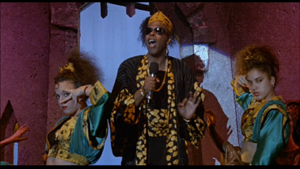 Video & Audio
Video & Audio"Mannequin" looks every bit the outdated transfer in both its original widescreen format (1.85:1, with anamorphic enhancement) and a pan-and-scan version on the flipside. Colors are nicely balanced, but there's a fair deal of grain and the whole thing's on the soft side. Then again, although I don't remember the movie ever looking very good.
The soundtrack is offered in Dolby Surround, which comes off more as a stereo track, really. It makes the most of the dialogue and incessant musical score. A French dub (also in Dolby Surround) is offered, as are optional English, French, and Spanish subtitles. (The packaging erroneously also lists a Spanish dub, which is not included.)
"On the Move" doesn't gain much from having the newer transfer. Presented in its original widescreen format (1.85:1, with anamorphic enhancement), the film is equally grainy and soft, although colors pop a little brighter here, a sign of a more bubble gum look given to cheap comedies of the time. English Surround is the only soundtrack option, and it's passable enough, clear and well balanced. Optional English, French, and Spanish subtitles are provided.
Extras
The "Mannequin" disc contains the film's trailer, plus previews for (now outdated) special edition DVDs for "The Princess Bride" and "Fiddler on the Roof." There are no extras on the "On the Move" disc.
Final Thoughts
Fans of truly wretched cinema will surely welcome the chance to own one of movie history's worst franchises at a low price, and to you, this set is Recommended based on budget value alone. I know I could watch the first movie repeatedly (and, in fact, have) just for the jaw-drop value alone. It's a Bad Movie Essential, and the sequel makes a nice addition. Those with lower cinematic pain thresholds, however, should obviously Skip It - these are two truly dreadful movies, presented here with mediocre transfers (one of which is a zero-effort double dip), no worthy bonus material, and twice the Starship.
|
| Popular Reviews |
| Sponsored Links |
|
|
| Sponsored Links |
|
|
| Release List | Reviews | Shop | Newsletter | Forum | DVD Giveaways | Blu-Ray | Advertise |
|
Copyright 2024 DVDTalk.com All Rights Reserved. Legal Info, Privacy Policy, Terms of Use,
Manage Preferences,
Your Privacy Choices | |||||||









